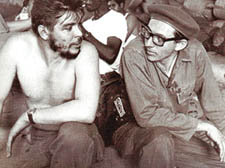|
|
 |
| |

Che Guevara (left) with government minister Orlando Borrega |
How Che sowed the seeds of Cuba’s success
Helen Yaffe tells Dan Carrier how she traced the economic nuts and bolts of the Castro revolution
Che Guevara: the Economics of Revolution.
By Helen Yaffe.
IT’S 1960, Havana, at the Cuban Ministry for Industry: it was one of the more surreal events John Paul Sartre had ever witnessed. The French philosopher had flown in on a visit to the island.
Government minister Orlando Borrego picked him up at the airport and whisked him off to see 200 astonished but delighted teenagers be inaugurated as senior managers in factories that had suddenly been nationalised in the early hours of the previous morning.
The story of what happened next has been revealed in a new book by Kentish Town-based economic historian Helen Yaffe.
Helen, who went to Acland Burghley School, lived in Cuba with her sister in the 1990s. Already interested in the country, its socialist history and what the future held for it, Helen’s fascination was underlined by her own experiences there and how the revolution, after 40 years, had brought about a quality of life that was incredibly wealthy in ways she had previously not imagined.
The Sartre story goes like this: Borrego had been called up the previous night by Che Guevara and told that they needed to somehow find 200 people by nine the next morning to run factories and sugar mills. The need was desperate: legislation had been rushed through in a special night-time cabinet meeting in the face of increasingly acrimonious actions by the US, who had private interests in the island and were nobbling much-needed reforms.
“I nearly had a heart attack,” recalls Borrego. “Where were we going to find them? I only knew about three people with any accountancy experience. Half an hour later Che called me again and said Fidel had a solution. There was a boarding school with 200 pupils aged between 15 and 20, training to be teachers.
“Fidel said: ‘We will nominate them as managers of the factories’. I was shocked! Minutes later Fidel called to tell me to go the school to wake them up even though it was the middle of the night. He arrived at 4am. The students went mad with joy, throwing their things up in the air.”
But with no official documentation confirming their new positions and Sartre about to arrive for a visit that would be good publicity for the regime, Borrego faced a further headache. The only computer on the island was used for greyhound betting. Instead he got a stencil kit and made up some official-looking letters, appointing the teenagers into their new posts. Then he collected Sartre, and the Frenchman looked on bemused as Borrego appointed a new generation of industrial managers.
“Sartre’s eyes were coming out of his head,” recalls Borrego. “‘You are crazy,’ he said. ‘They are adolescents’.”
The story of what happened in the immediate years after Fidel and Che took power in Cuba in 1959 has often been overlooked: when it comes to considering Guevara, there is a tendency either to think of him as a romantic fighter, chomping on his cigar as he battled imperialism, or look at Cuba in wider terms of the Cold War conflict between the US and the USSR.
However, Helen has used interviews with 60 key figures of the post-revolution government in her book, Che Guevara: the Economics of Revolution, to draw together for the first time an account of the problems the new regime faced and how they tackled them. Che and Fidel took power to fulfil the aims of the revolution: raise living standards, ensure equality of access to health, education and earning a living for all the people on the island. And she argues that Cuba is a model for how modern societies can approach economic problems for the good of all.
Che’s energy, allied to a wider political aims, emerged from her interviews.
“He had a vision of what was needed,” she says. “Seizing power was the easy part. But what then would you do with it, especially when there was a massive exodus among the members of the middle classes.”
Furthermore, Helen’s book also lays bare other misconceptions about Cuba, such as a lack of democratic processes.
“If you could learn something now from Cuba it is about how to manage state planning,” she says.
“This is not symbolic democracy, its about talking with people who have an impact on your life. There is a process of consultation with people who will be effected by policies. They discuss policies in work places and they are asked anonymously to put forward proposals. What comes out of this are concrete proposals that lead to further reforms driven by the people who they directly effect.”
•
|
 |
|
 |
 |
|
 |
|


